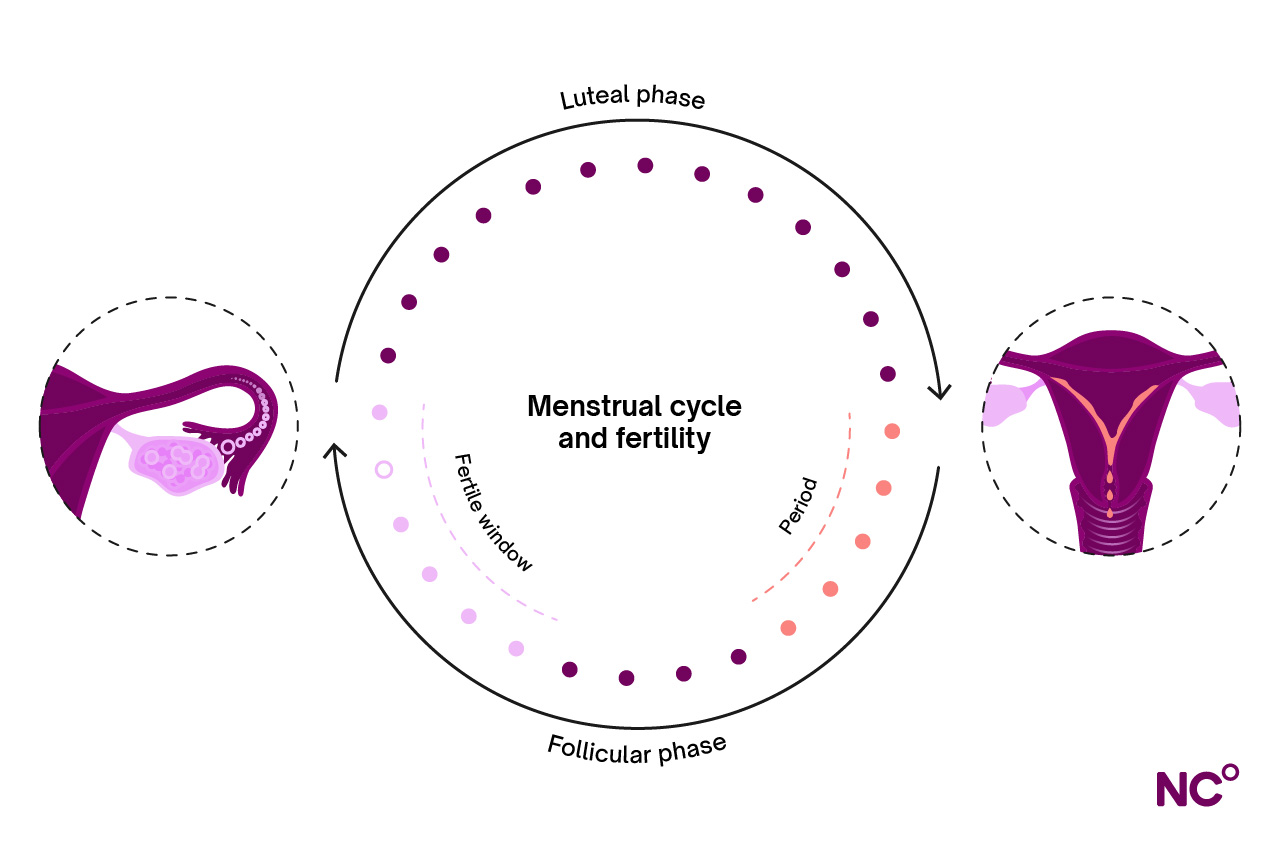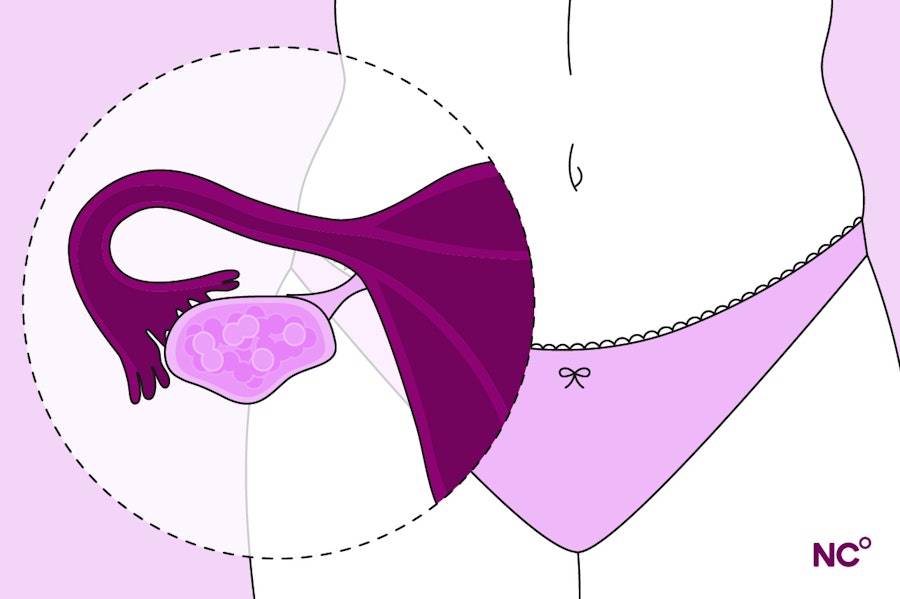Can you get pregnant without ovulating?
Follows NC° Editorial Policy
At Natural Cycles, our mission is to empower you with the knowledge you need to take charge of your health. At Cycle Matters, we create fact-checked, expert-written content that tackles these topics in a compassionate and accessible way. Read more...
Key takeaways:
- It’s only possible to get pregnant naturally if you ovulate, and even then, there is only a small window in the cycle when conception is possible
- Your highest chances of getting pregnant happen during the day before ovulation and the day of ovulation when the egg is released. You are also fertile for up to five days before this, as sperm can survive in the female reproductive system for five days
- If you do not ovulate, sperm cannot fertilize the egg cell and thus, you cannot get pregnant
- For those who have found it hard to conceive, it’s possible to increase the chances of pregnancy through fertility treatment
Your body releases a mature egg cell once each cycle. This process is called ovulation, and the egg cell can live in the body for up to 24 hours after being released. It's during these 24 hours that sperm can fertilize the egg, making this day-long period key for conception. But did you know you’re actually fertile for a number of days before you ovulate too? That’s because sperm cells can live up to five days in the female reproductive tract.
If you’re not ovulating due to fertility issues or hormonal birth control, you may be wondering if it’s still possible for you to get pregnant without ovulating. In this article, we’ll take a closer look at how ovulation affects the fertile window and clear up any doubts about when you can or can’t get pregnant.
Can you get pregnant outside a fertile window?
The short answer here is no, but it can be difficult to predict exactly when that fertile window happens. You cannot get pregnant without ovulating or outside of your fertile window.
Let’s go through the odds of pregnancy during each phase of your menstrual cycle.
Different phases of your cycle & your chances of getting pregnant:
Before ovulation
The fertile window starts five days before ovulation. If your goal is to conceive, you should have sex during this window. Even though ovulation hasn't happened yet, you're still fertile during this time because sperm can survive in your body for up to five days. So, while conception doesn’t happen until the sperm and egg cell meet, it’s possible to get pregnant if you have sex before you ovulate. [1]
During ovulation
With that in mind, your highest chances of getting pregnant can actually happen during ovulation. This is the one time per cycle when an ovary releases a mature female egg cell. The cell lives in your body for 12 to 24 hours, and conception can happen any time within that time. After 24 hours, the egg cell begin to disintegrate and conception is no longer possible.
The kicker here is that it’s quite difficult to predict exactly when you’re going to ovulate each month. The general scientific consensus is that it happens around the middle of your cycle, but this timeline varies from person to person. [2] Learn more about signs of ovulation and some clues to know when you’re ovulating here.
After ovulation
If ovulation ends and the egg cell has been fertilized, conception has occurred and the pregnancy journey begins. Learn more about the days past ovulation timeline and signs of early pregnancy here.
If the egg was not fertilized during ovulation, your chances of pregnancy drop and you enter the luteal phase of your menstrual cycle. Levels of a hormone called progesterone rise in your body, increasing your body temperature and softening the uterine lining. This prepares the lining to shed, along with the unfertilized egg cell, during your period. This happens gradually over the course of about a week, and can also come with PMS symptoms.
On your period
There is a very slight chance that you can get pregnant if you have sex during your period but only if you happen to have a very short cycle where you ovulate soon after your period ends. This is extremely unlikely but can happen in rare cases. Read more about the chances of getting pregnant on your period.
Right after your period
Depending on your cycle length, there may be a few short days right as your period ends when your chances of getting pregnant are still quite low, but remember that in the five days before ovulation, your chances increase again. [2]
So, can you get pregnant on a non-fertile day?
It’s not possible to get pregnant when you’re not fertile, but you can’t rule out the possibility of pregnancy if you’re having intercourse without contraception throughout your cycle. This is because you can’t be sure exactly when you will be fertile — ovulation days can vary from cycle to cycle and things like stress can have an effect on cycle length and regularity. So, knowing the unique pattern of your menstrual cycle is really important when it comes to finding the fertile window — more on that later.

Cycles without ovulation: can you conceive?
We’ve just gone through the chances of getting pregnant during a typical menstrual cycle, but what if you’re on hormonal birth control, like the pill, and you don’t usually ovulate?
As we’ve learned, ovulation must occur in order to conceive. Remember that conception is when the male sperm cell fertilizes the female egg cell released during ovulation. With that in mind, it’s very unlikely that you would become pregnant if you’re not ovulating (in fact, many hormonal birth control methods work by preventing ovulation).
However, in some cases, ovulation can still happen on birth control. If you miss a pill or don’t follow the exact instructions for use, you are at risk of becoming pregnant. No birth control is 100% effective, but if you use the pill as directed, the chances of getting pregnant are less than 1%.
But what if you’re not on hormonal birth control and you don’t seem to be ovulating? To answer this question, you’ll need to know about anovulation.
What is anovulation?
The medical term for a menstrual cycle without ovulation is an “anovulatory cycle.” While this may sound a bit worrying, the occasional anovulatory cycle can happen to anyone from time to time. The causes of this are not well understood, but if you have multiple anovulatory cycles in a row (meaning you're regularly not ovulating), this can be a symptom of an underlying cause.
The most common cause of anovulation is polycystic ovary syndrome (PCOS), a condition that accounts for up to 85% of all patients experiencing ovulatory disorders. [3]
How is anovulation treated?
If you suspect that you’re not ovulating, don’t delay in reaching out to a medical professional with your concerns. It may be helpful to start tracking your cycle and symptoms as well. This awareness of your body’s unique patterns over time can help you see when you do or don’t ovulate, your cycle length variability, and other factors that will help inform a discussion with your doctor about diagnosis. You could also try luteinizing hormone tests to help figure out whether or not you’re regularly ovulating.
Treatment may involve lifestyle changes, new medications, IVF, or hormone therapy. [3] Remember that once you start ovulating again, your chances of getting pregnant significantly increase.
How long does it take to get pregnant?
To give you a better idea of how long it may take you to get pregnant, let’s take a look at a study that tested the effectiveness of using Natural Cycles to plan pregnancy. It followed a group of women who were less than 35 years old and had about the same average menstrual cycle length (within 5 days of variability).
This cohort logged unprotected sexual intercourse on at least 20% of the days during the study. On average, the time to pregnancy for this group was two cycles. The study concluded that Natural Cycles was an effective and non-invasive method of identifying the fertile window, leading to a high pregnancy rate within 12 months (95% of participants were able to conceive within that time frame). [4]
It’s recommended to see your doctor for a fertility consultation if you haven’t conceived within 12 months of trying and you are under 35 years old with no known fertility issues. For women 35 and up, you should see your doctor within 6 months of trying if you’re having trouble getting pregnant. [2]
Know your body better with Natural Cycles
Natural Cycles is an FDA Cleared pregnancy planning and period tracking method that can help you figure out when you’re ovulating based on your unique menstrual cycle. You can also log all the signs and symptoms that you experience over time to identify patterns and get to know your body on a deeper level.
Couples who use Natural Cycles get pregnant in three cycles on average [5], but whether you’re trying to get pregnant or avoid pregnancy, Natural Cycles can empower you to make informed choices along your fertility journey.
Did you enjoy reading this article?
